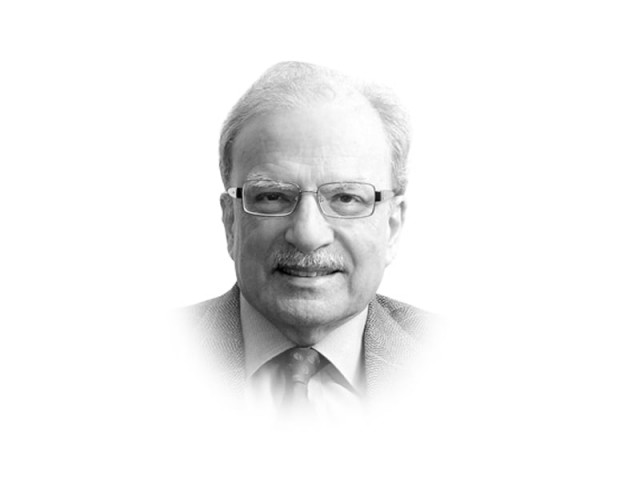Breakdown of the grand bargain — II
The Arab Spring has resulted in breaking down the ‘grand bargain’ between the West and Arab and Muslim worlds.

It had four components. Three of these were promises of good behaviour in terms of the strategic interests of the West on the part of the ruling establishment. The fourth was the implicit — on some occasions explicit — promise by America and Europe to protect the establishment from its own people.
The West wanted the Arab leaders to ensure its access to the vast energy resources of the region. Its dependence on oil from the Middle East increased in the 1990s as the rates of economic growth in almost all countries in this part of the world reached levels without precedence in their recent economic histories. None of the western capitals wished to live through once again the uncertainty and economic upheaval caused by the oil embargo imposed by the Arab oil producers to punish the United States for its unqualified support of Israel. That was the first and only time the Arab governments took collective action to protest what they considered to be the wrong done to the Palestinians by the West, in particular by the United States.
The West also wanted unhindered access to the economically and strategically important sea lanes that pass through the waters controlled by the countries in the area. The memory of the 1956 nationalisation of the Suez Canal by Gemal Abdul Nasser, the nationalist leader of Egypt, while dimmed by time, was still a part of the strategic thinking in the West. The nationalisation was the only time that a deep fissure developed among the western countries in the post-World War era. Britain and France attempted to annul Nasser’s act by sending in their militaries while the United States was troubled by the moves of the two major European powers. The Israelis also moved their troops and flotilla and another war in the Middle East seemed imminent. However, Washington stepped in to prevent any such flare-up. President Dwight Eisenhower ordered London and Paris to pull back their assault troops, the only time the United States took an action that was not totally in favour of the Jewish state.
The third element in the grand bargain was the Arab acceptance of the creation of Israel and the recognition of the Jewish state. A significant step in that direction was taken by Egypt when its president on March 26, 1979 signed the peace agreement with Menachem Begin, the prime minister of Israel. The move was not welcomed for some time by the rest of the Arab world. A few months after the signing of the agreement in America, the Arab League expelled Egypt from its membership and moved its headquarter from Cairo and Tunis. While the boundaries of Israel were not defined in this agreement or the one signed subsequently with Jordan by Israel, the Israelis kept changing the ‘facts on the ground’ by expanding their settlements deep into the West Bank. They have continued to implement this strategy.
In return for these three parts of the grand bargain, the West implicitly pledged not only to tolerate the Arab regimes but provide them with military support when their existence was threatened by some internal forces. They also allowed the members of the establishment to store their looted riches in the West — in the form of large bank accounts and large real estate holdings. This is one reason why George HW Bush, then the American president, went to war in 1991 to expel Saddam Hussein from Kuwait after the latter had invaded the country in his immediate neighbourhood. Allowing Saddam to stay in Kuwait would have been against the grand bargain. He had to be expelled.
It didn’t matter that the regimes the West supported were often brutal towards their people and plundered the enormous wealth of the countries over which they presided. It should have been seen by the parties involved in the grand bargain that it would not produce a stable economic and political order. Several policy analysts had warned as long ago as the 1960s when their works were published in the United States that political institutions must be allowed to develop to accommodate economic change. One of them was Samuel P Huntington, a Harvard political scientist who was later to win fame by predicting what he called a clash between two civilizations, the West and Islam. In an earlier work he argued that economic progress produces societal tensions. He suggested, in a book titled Political Order in Changing Societies, that those who feel “relatively deprived” will agitate, if not altogether rebel, against the state. The same conclusion was reached by the economist Albert O Hirschman, also of Harvard University, who discussed the three choices that are available and could be exercised by the deprived – exit, voice or royalty. The Arab street chose voice over the two other options.
With the Arab Spring having disposed of three long-enduring regimes — in Tunisia, Egypt, and Libya, in that order — and may succeed in bringing down at least three more — Bahrain, Syria and Yemen, difficult to say in which order — the will of the people can no longer be ignored. Factoring in what the people want in policymaking has already resulted in the collapse of the ‘grand bargain”. A new order has already begun to take shape and will affect the relations of the countries in the region with the West, in particular with the United States.
Published in The Express Tribune, October 10th, 2011.



















COMMENTS
Comments are moderated and generally will be posted if they are on-topic and not abusive.
For more information, please see our Comments FAQ